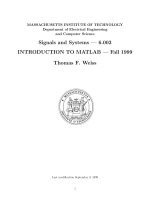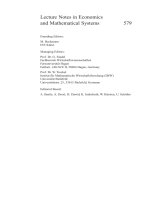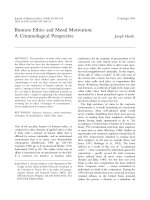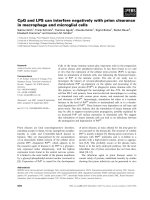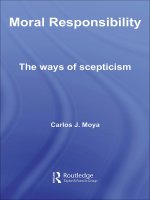Routledge Studies in Ethics and Moral Theory pdf
Bạn đang xem bản rút gọn của tài liệu. Xem và tải ngay bản đầy đủ của tài liệu tại đây (3.02 MB, 220 trang )
Moral Responsibility
We are strongly inclined to believe in moral responsibility, that some human agents truly
deserve moral praise or blame for some of their actions. However, recent philosophical
discussion has put this natural belief in the reality of moral responsibility under suspicion.
There are important reasons to think that moral responsibility is incompatible with both
determinism and indeterminism, possibly rendering moral responsibility an impossibility.
This book lays out the major arguments for scepticism about moral responsibility and
subjects them to sustained and penetrating critical analysis. Moral Responsibility lays out
the intricate dialectic involved in these issues in a helpful and accessible way. The book
goes on to suggest a way in which scepticism can be avoided, arguing that an excessive
pre-eminence given to the will might lie at the root of scepticism of moral responsibility.
Carlos Moya offers an alternative to scepticism, showing how a cognitive approach to
moral responsibility which stresses the importance of belief would rescue our natural and
centrally important faith in the reality of moral responsibility.
Carlos J.Moya lectures in philosophy at the University of Valencia, Spain.
Routledge Studies in Ethics and Moral Theory
1. The Contradictions of Modern Moral Philosophy
Ethics after Wittgenstein
Paul Johnston
2. Kant, Duty and Moral Worth
Philip Stratton-Lake
3. Justifying Emotions
Pride and Jealousy
Kristján Kristjánsson
4. Classical Utilitarianism from Hume to Mill
Frederick Rosen
5. The Self, the Soul and the Psychology of Good and Evil
Ilham Dilman
6. Moral Responsibility
The ways of scepticism
Carlos J.Moya
Moral Responsibility
The ways of scepticism
Carlos J.Moya
LONDON AND NEW YORK
First published 2006 by Routledge 2 Park Square, Milton Park, Abingdon, Oxon, OX14 4RN
Simultaneously published in the USA and Canada by Routledge 270 Madison Avenue, New York,
NY 10016
Routledge is an imprint of the Taylor & Francis Group
This edition published in the Taylor & Francis e-Library, 2006.
“To purchase your own copy of this or any of Taylor & Francis or Routledge’s collection of
thousands of eBooks please go to
© 2006 editorial matter and selection Carlos J.Moya
Excerpts from The significance of free will by Robert Kane, copyright © 1996 by Robert Kane.
Used by permission of Oxford University Press, Inc.
Excerpts from The importance of what we care about by Harry G.Frankfurt, copyright © 1998 by
Harry G. Frankfurt. Used by permission of Cambridge University Press.
All rights reserved. No part of this book may be reprinted or reproduced or utilised in any form or
by any electronic, mechanical, or other means, now known or hereafter invented, including
photocopying and recording, or in any information storage or retrieval system, without permission
in writing from the publishers.
British Library Cataloguing in Publication Data A catalogue record for this book is available from
the British Library
Library of Congress Cataloging in Publication Data A catalog record for this book has been
requested
ISBN 0-203-96560-4 Master e-book ISBN
ISBN10: 0-415-37195-3 (Print Edition)
ISBN13: 978-0-415-37195-7 (Print Edition)
Taylor & Francis Group is the Academic Division of T&F Informa plc.
For my dear Milagro, Nuria and Ana And to the memory of J.L.Blasco
Contents
A
cknowledgements
viii
Introduction: scepticism about moral responsibility (SMR)
1
1
Determinism and alternative possibilities (SMR’s premises A and B)
9
2
Alternative possibilities and moral responsibility (SMR’s premise B)
26
3
Moral responsibility and control (SMR’s premise B)
76
4
Indeterminism and moral responsibility (SMR’s premise C)
114
5
Overcoming scepticism? Belief and moral responsibility
143
Conclusion
184
N
otes
192
R
eferences
197
I
ndex
201
Acknowledgements
I have been interested in the subjects of moral responsibility and free will for many years.
During this time I have benefited from exchanges and conversations with many people.
I cannot mention them all, but let me give special thanks to my students, both
undergraduates and postgraduates. I have learnt from them more than I have taught them.
I should also mention my colleague and friend Tobies Grimaltos, with whom I have been
giving a postgraduate course on freedom and related issues for several academic years.
I owe to him much stimulus and help, though I have not been able to convince him that
determinism is not a self-evident and necessary truth. Let me also thank other colleagues
in the Department of Metaphysics for many ways in which they have helped me to
develop my ideas about free will and moral responsibility.
Writing this book was possible owing to a grant awarded in 2002 by the Spanish
Ministry of Education within a scheme called (in English translation) “Grants for stays of
Spanish University teachers in foreign and Spanish research centres, including the
program ‘Salvador de Madariaga’”. So I am much indebted to the Spanish educational
authorities for giving me this excellent opportunity, as well as to the University of
Valencia for granting the leave I applied for, which allowed me to spend all the academic
year 2002–3 in the Department of Philosophy of the University of Sheffield. I must thank
the teaching and administrative staff of the Department for their help and hospitality.
Special thanks are due to Christopher Hookway, who was responsible for my research
and wellbeing during my stay and helped me at several times with his comments and
advice about some parts of the manuscript. I am also grateful to Stephen Laurence for
inviting me to present some of the work I had been doing so far in a session of the
excellent weekly Seminars of the Philosophy Department. This was a good opportunity
for giving wider publicity to my thoughts on free will and moral responsibility and
improving my work. Several members of the Department made very good and helpful
comments and criticisms of my paper, which included part of what is now the second
chapter of this book. I am also grateful to Jennifer Saul and Leif Wenar, who read some
parts of the manuscript and gave me good advice and encouragement.
I have also presented aspects of this book in various seminars and conferences and I
have highly benefited from the reactions, comments and criticisms of the respective
audiences. I am grateful to Saul Smilansky and Jonathan Dancy, from whom I received
help and good comments during conferences in Lund and Granada. Many thanks are also
due to Juan Acero, who invited me to present the main lines of my research on moral
responsibility in a seminar that took place recently in the Philosophy Department of the
University of Granada; and many thanks to the members of the Department who attended
the seminar and offered good and useful remarks. I am also grateful for a seminar I gave
in Valencia to other members of Phronesis, an analytic philosophy group. Lino San Juan
and Marta Moreno deserve special thanks for their comments during this seminar. I am
very grateful to Eduardo Ortiz for reading the whole manuscript and making wise
remarks on it. I should also thank Raimo Tuomela for inviting me to take part in a one-
day symposium on action, freedom and responsibility which took place recently in
Helsinki, where I met Alfred Mele and Robert Audi, as well as several postgraduate
students in the Department of Social and Moral Philosophy and benefited from their
papers and their comments on mine.
At a different but no less important level I have to express my gratitude to the persons
who made my almost ten months in Sheffield an agreeable and enjoyable experience.
First of all I have to thank my wife, Milagro, and my little daughter, Ana, who spent in
Sheffield a large part of those months. Without their love, company and encouragement,
writing this book would have been a much harder task, and I wonder whether it would
have been possible at all. The stay in Sheffield was a very good period for us three. The
fact that we lived in a beautiful Edwardian house, in a quiet and nice area, contributed a
lot to our happiness and wellbeing. And we all have to thank Jo Hookway for having
found this house and for many other ways in which she cared about us. She and her
husband, Chris, were invariably good hosts and friends, and we keep a debt of gratitude
to them. We are also grateful to the Overseas Wives Wednesday Club of the University
of Sheffield, a certainly admirable institution. Joining it made an invaluable contribution
to Milagro’s (and thereby to Ana’s and my own) happiness and contentment. Let us
express our gratitude to some members of the staff. These include Mrs Rosemary
Boucher, who encouraged Milagro to join the club and made her access to some related
services possible, as well as Mrs Marion Maitlis, a lively and lovely lady whose kindness
and warmth we will always remember. A younger Dutch lady, Arnolda Beynon, was also
very kind with us, and we still remember the wonderful house she and her husband
possess in the Peak District, where we enjoyed their company and a nice meal. Let me
also mention some other persons who made the stay in Sheffield warmer and nicer. They
include Jenny Saul and her husband, Ray, who offered us their house for an excellent
dinner as well as for a nice party, and Rob Hopkins, who invited me to his house and
cooked a memorable turbot he had bought in Birmingham’s fish market. After Milagro
and Ana had left Sheffield, and I started to feel a bit lonely, it was very important for me
to enjoy the company of some Spanish friends. Antonio Peidro, an old friend of mine,
spent some days in my house. And I will always remember the wonderful moments spent
with him and with my new (and much younger) friends Esa Diaz, Alfredo Muyo and
Tamara Ojeda.
This book falls within the scope of the research project BFF2003–08335– C03–01,
awarded by the Spanish Ministry of Education.
Most of subsection “Actual blockage cases”, in Chapter 2, was previously published in
Critica, vol. 35, 2003, pp. 109–20. I thank the editors of this journal for allowing me to
use this material.
Let me finally acknowledge the permissions that have been granted for reproducing
extracts from the following works:
• The Significance of Free Will by Robert Kane, copyright 1996 by Robert Kane. Used by
permission of the author and Oxford University Press, Inc.
• Freedom Within Reason by Susan Wolf, copyright 1990 by Oxford University Press.
Used by permission of Oxford University Press.
• The Importance of What We Care About by Harry G.Frankfurt, copyright 1988
Cambridge University Press. Reproduced with permission of the author and publisher.
• Responsibility and Control: a theory of moral responsibility by John Martin Fischer and
Mark Ravizza, copyright 1998 Cambridge University Press. Reproduced with
permission of the publisher.
• Freedom and Belief by Galen Strawson, copyright 1986 by Galen Strawson. Used by
permission of Oxford University Press.
• An Essay on Free Will by Peter Van Inwagen, copyright Peter Van Inwagen 1983. Used
by permission of Oxford University Press.
• “Source incompatibilism and alternative possibilities” by Derk Pereboom, in
D.Widerker and M.McKenna (eds) Moral Responsibility and Alternative Possibilities,
2003, Ashgate Publishing Company. Used by permission of the publisher.
Introduction
Scepticism about moral responsibility (SMR)
The main concern of this book is scepticism about moral responsibility. By “moral
responsibility” I understand that property of human agents by virtue of which they truly
and objectively deserve moral praise or blame for some of their actions. We are naturally
non-sceptical about this property. Even philosophical sceptics tend to praise or blame
people spontaneously for some of their actions, though they may try to recoil from these
spontaneous reactions after reminding themselves of their own reflectively acquired
scepticism. The actions for which we hold human agents to be truly morally praise- or
blameworthy are those that we judge to be morally right or wrong and that we assume
were up to them. “Up to them” means roughly that these actions are ultimately
attributable to the agents as their sources or authors and that, with respect to such actions,
they had available alternatives: they could have acted in a different way, or could simply
have avoided acting as they did. We assume that sometimes, indeed rather often, these
conditions for moral responsibility, understood in the sense of objective praise- or blame
worthiness, are actually met by human beings. If we come to think that, at some
particular occasion, they are not, we naturally soften or even withdraw our judgement.
But consider that being able to satisfy these conditions in some particular occasions is
what we understand by being a free agent. These conditions, then, are central to our
notion of freedom, or of free will. We are also naturally convinced that many—perhaps
most—human beings are free agents, or have a free will in that sense: that they can be
authors or sources of some of their actions and that, in relation to those actions, they
could have done otherwise. We may also say, then, that, on the assumption that a
particular agent is a free agent, we hold her truly morally responsible for a particular
action provided that we believe that, in acting that way, she exercised such ability (met
those conditions) and so acted freely. In other words, we naturally assume that freedom is
a necessary condition of moral responsibility. This is why we refuse to ascribe moral
responsibility to some animals, or to small children: we think they lack a free will or, to
use a medieval expression, a liberum arbitrium.
These convictions are a common starting point for all those who begin to think
philosophically about these matters. Without these basic, natural intuitions, the
philosophical problems of free will and moral responsibility would not exist. These
problems arise, however, when we start reflecting on what would have to be the case in
order for these natural intuitions to be true. It soon appears, on reflection, that being a
free agent, and so one who may objectively deserve moral praise or blame for some of
her actions, is trickier than it appears from our natural, spontaneous point of view. At the
end of this reflection, some thinkers may come to the sceptical conclusion that having a
free will, and so being a morally responsible agent, is just not possible.
If, as seems initially true, free will is a necessary condition of moral responsibility,
scepticism about the former implies scepticism about the latter. In fact, scepticism about
free will has grown significantly in recent times. To mention only a few examples, such
books as The Non-reality of Free Will (Double 1991), Free Will and Illusion (Smilansky
2000) or Living Without Free Will (Pereboom 2001), whose titles are already expressive
enough of their content, bear witness to this increasingly sceptical stance about free will.
Not surprisingly, the authors of these books are sceptical about moral responsibility as
well. There have, however, been some attempts to prevent scepticism about free will
from spreading to moral responsibility, by rejecting the view that free will, understood as
freedom to choose or act otherwise, is actually required for moral responsibility. We shall
refer to these attempts later in this book, and argue that they are not successful. However,
holding that freedom to do otherwise is not required for moral responsibility is not
enough for that purpose, unless one is also prepared to accept that being the true origin or
author of some of our actions, by having control over their springs, is not required for
moral responsibility either. Moreover, there is room to argue (correctly, in our view) that
these two conditions, alternative possibilities and authorship or control, as they might be
called, are not independent of one another, so that lack of alternatives undermines the
degree of origination and control that would be required for moral responsibility.
The main source of scepticism about moral responsibility is, then, scepticism about
free will, or about the freedom-relevant conditions of moral responsibility. This is the
route towards scepticism about moral responsibility that we shall be investigating in this
book.
From a historical point of view, belief in free will was soon perceived to be in tension
with the possibility of a world, of which human beings are a part, governed by fate, or
necessary natural laws, or the decrees of God. Necessity, in any of these forms, was
widely felt to be threatening to human freedom. So, for example, both ancient Epicureans
and Stoics came to think that, if the atoms, the ultimate constituents of all things, obeyed
ineluctable laws, human freedom would not be possible: both alternative possibilities and
control would be ruled out, and with them moral responsibility, understood as true desert.
This is the first clear statement of what is presently known as incompatibilism, the thesis
that determinism and freedom cannot coexist. While Epicureans attempted to leave room
for human freedom by holding that atoms sometimes suffered uncaused and
unpredictable swerves, thereby adopting a libertarian position, the Stoics instead
embraced the doctrine of unrestricted natural necessity and, consequently, denied that
human freedom was possible. They were, in today’s terminology, hard determinists.
Strong echoes of stoicism can be heard in the work of Spinoza, a prominent hard
determinist.
The assumption that determinism is not compatible with freedom is natural and was
generally taken for granted until fairly modern times. Even nowadays, non-philosophers
tend to accept it as almost self-evidently true. But Hobbes and Hume called it into
question by first advancing compatibilism. Hume presented compatibilism, the thesis that
there is no contradiction, no incompatibility between determinism and freedom, as the
solution to the venerable problem of the relationship between them. However, far from
being generally accepted as an end-point to the controversy, compatibilism quickly
became a third contender in the discussion, along with the two traditional forms of
Moral responsibility: the ways of scepticism 2
incompatibilism, namely libertarianism, which holds that human freedom exists and that
therefore determinism is false, and hard determinism, which sustains the opposite thesis.
Though in a large number of versions and with many nuances, these three broad
positions can still be said to roughly define the field of contemporary discussion about
free will and moral responsibility, and each of them has important representatives.
However, a new character has appeared on the scene, namely the true, across-the-board
sceptic, who holds that free will and moral responsibility are certainly incompatible with
determinism, but also with indeterminism. Though the hard determinist can also be said
to be a sceptic about free will, in so far as she believes that determinism is true and that it
precludes free will, if determinism were false after all, then free will might be a real
property of (some) human beings. The true, across-the-board sceptic, however, closes this
crack as well.
This radical form of scepticism is a late fruit of a significant difference between the
traditional and the contemporary discussion, namely that, unlike what was generally the
case after the outbreak of modern mathematical natural science and especially of classical
Newtonian physics, a strictly deterministic view of nature has ceased to be widely taken
for granted, and the possibility that some basic physical processes may be indeterministic
has been taken seriously. Some libertarian incompatibilists viewed, and still view, the
probabilistic laws of quantum physics as the natural enabling condition of freedom that
they were hoping for and as a support for their philosophical position. However, the
suspicion quickly arose that, as early compatibilists had already suggested, indeterminism
might be threatening to free will and moral responsibility. If, according to the
deterministic picture, human choices and actions are inevitable outcomes of the past and
the natural laws, then, according to incompatibilists, free will is undermined, for there
seems to remain no room for either of its aspects, namely alternatives and deep
origination or control. Since these, in turn, are the freedom-relevant necessary conditions
for moral responsibility, this property loses its footing as well. But if human choices and
actions are instead the result of unpredictable, random events in our brain at the
subatomic level, then, even if alternative possibilities are possible, control over our
choices between them, and the associated idea of our being true authors and sources of
our actions, are no less effectively eroded, and with them free will and moral
responsibility as well.
So the rise of a rigorous, natural-scientific, indeterministic view of the natural world
has reshaped the contours of the philosophical problems of free will and moral
responsibility. In one sense, it has worsened those problems rather than solving them. The
traditional question of the compatibility between free will and a deterministic natural
world has been enlarged so as to encompass the compatibility between free will and an
indeterministic natural world as well. And a negative answer to both questions has given
rise to the radical, across-the-board form of scepticism that we have referred to. The
threat to the possibility of free will and moral responsibility does not come just from a
deterministic natural world, but from the natural world as such, whether deterministic or
not. And if those properties are shown to be incompatible with the natural world,
whatever its ultimate structure may be, the suspicion arises that the concept of such
properties is simply incoherent and so unable to be instantiated at all.
Introduction: scepticism about moral responsibility (SMR) 3
This radical, across-the-board form of scepticism about moral responsibility, on the
basis of scepticism about its freedom-relevant conditions, will be the central theme of this
essay. To proceed in an orderly, systematic way, we shall conceive of this form of
scepticism as the conclusion of a very general sceptical argument that we shall dub
“SMR” (scepticism about moral responsibility). This argument is an abstract, simplified
reconstruction out of several positions held in contemporary debates about moral
responsibility and free will. But some closely related arguments can also be found in an
explicit form in some recent works. It may be useful to look at some of them before
formulating SMR. Common to all these arguments, including SMR, is a disjunctive
premise asserting that either determinism holds or it does not.
An argument of this sort can be found explicitly formulated in a recent paper by Peter
Unger. It concerns free will rather than moral responsibility, and gives expression to what
nowadays, in Unger’s words, “may be the real heart of ‘the problem of free will’” (Unger
2002:4). The argument is as follows:
First Premise: If Determinism holds, then, as everything we do is inevitable from long
before we existed, nothing we do is anything we choose from available alternatives for
our activity.
Second Premise: If Determinism doesn’t hold, then [while some things we do may be
inevitable from long before our existence and, as such, it’s never within our power to
choose them for ourselves] it may be that some aren’t inevitable—but, as regards any of
these others, it will be a matter of chance whether we do them or not, and, as nothing of
that sort is something we choose to do—nothing we do is anything we choose from
available alternatives for our activity.
Third Premise: Either Determinism holds or it doesn’t.
Therefore,
Conclusion: Nothing we do is anything we choose from available alternatives for our
activity.
(Unger 2002:4)
This is a sceptical argument about free will understood in terms of choice between
alternative possibilities, as freedom to do otherwise. It is silent, however, about free will
understood in terms of control and origination. As a result, it is not clear why, from the
fact that whether we do something or not is a matter of chance, we should infer that we
do not choose (in the relevant sense) at all. Moreover, as it stands, this argument does not
threaten moral responsibility. For it to do so, an additional premise would be needed, to
the effect that choosing from available alternatives is a requirement for moral
responsibility. Unger’s argument, however, manifests a consciousness of the new shape
that the old problem of free will has taken in recent times, and of the radical form of
scepticism it has given rise to. We shall see how this new shape and this radical sceptical
stance affect the question of moral responsibility as well. This question has a wider scope
than the question of free will, since it encompasses the latter as well. In this broader
context, some of Unger’s contentions in his sceptical argument will receive further
illumination and support.
Moral responsibility: the ways of scepticism 4
Van Inwagen (2000) also considers a similar sceptical argument about free will. He
thinks that compatibilism, the thesis that free will is compatible with determinism, is
implausible, but he adds that free will “also seems to be incompatible with
indeterminism”. Though he is a libertarian, not a sceptic, and thinks that “free will
undeniably exists”, he sees the strength of the scepticism that is thereby generated, and
his conclusion in that paper reflects his puzzlement: “I conclude that free will remains a
mystery—that is, that free will undeniably exists and that there is a strong and
unanswered prima facie case for its impossibility” (Van Inwagen 2000:1–2).
On the basis of the preceding considerations, let us now proceed to formulate our own
sceptical argument, SMR. In the simple, canonical form in which we propose to construe
and deal with it in this book, the argument runs as follows:
SMR (Scepticism about moral responsibility):
A. Either determinism is true or it is not true.
B. If determinism is true, moral responsibility is not possible.
C. If determinism is not true, moral responsibility is not possible.
D. Therefore moral responsibility is not possible.
SMR is patently valid. Whether it is sound, and so whether it establishes the truth of its
sceptical conclusion, will thus depend upon the truth of its premises. Premise B is the
traditional incompatibilist thesis as applied to determinism and moral responsibility rather
than free will. Premise C expresses the view that moral responsibility is also incompatible
with indeterminism. The argument thus reflects the radical, across-the-board form of
scepticism we have been talking about, as the sign of—paraphrasing Unger—the real
heart of the problem of moral responsibility in present times.
The structure of this book is closely related to the structure of SMR itself. Given that
SMR is logically valid, the book is concerned, in its first four chapters, with the reasons
for thinking that its premises are true. After commenting rather briefly on premise A, the
first chapter embarks on the discussion of premise B. Chapters 2 and 3 are devoted to a
further discussion of this premise, while Chapter 4 deals with premise C. This task
involves a rather long perambulation through large areas of contemporary debates about
moral responsibility and free will. The conclusion of these four chapters is that the
reasons for the truth of SMR’s premises are very powerful and that, consequently, the
case for SMR’s sceptical conclusion about moral responsibility is also very strong. The
fifth, and final, chapter is an attempt to resist this conclusion by showing a way in which
one of SMR’s premises, namely premise C, might be questioned.
More precisely, a tree trunk and its roots could represent the structure of this book in
its first four chapters. Thus the book has a ramified structure. Following this metaphor,
the trunk corresponds to SMR’s sceptical conclusion, namely that moral responsibility is
not possible. The trunk is supported by three thick roots, the three premises of SMR, each
of which is necessary, and all of them jointly sufficient, for the trunk to stand firmly in
place. While premise A is mainly self-supporting, premises B and C need additional
support. Each of these two premises is the conclusion of further arguments and is
supported by their premises.
Introduction: scepticism about moral responsibility (SMR) 5
Premise B is the conclusion of two independent arguments, each of which, if sound, is
sufficient for its truth. The first of these two arguments, which we dub “the
Incompatibilist Argument”, has the following two premises: 1) Determinism rules out
alternative possibilities of decision and action; and 2) alternative possibilities are
necessary for moral responsibility. The premises of the second argument are:
1) Determinism rules out ultimate control over our actions; and 2) ultimate control is
necessary for moral responsibility. The conclusion of either argument is SMR’s premise
B, namely that, if determinism is true, moral responsibility is not possible, or, in other
words, that determinism is incompatible with moral responsibility.
The first premise of the Incompatibilist Argument is discussed in Chapter 1, viewing it
as the conclusion of several arguments, the main one of which is the so-called
Consequence Argument. The second premise of the Incompatibilist Argument is in turn
dealt with in Chapter 2. We argue for the truth of this premise mainly in a negative way,
trying to show that none of the attacks on it, of which Frankfurt’s has been the most
influential, is finally successful.
The premises of the second argument for SMR’s premise B are discussed in the third
chapter. The first of these premises, namely that determinism is incompatible with
ultimate control, is largely taken for granted, on the basis that it follows immediately
from the very concept of determinism. More contentious is premise 2, according to which
ultimate control is required for moral responsibility. This premise is the main subject of
Chapter 3. We argue for its truth on the basis that the main approaches to moral
responsibility that attempt to dispense with ultimate control can thereby be shown to be
ultimately flawed.
The outcome of these three chapters is that SMR’s premise B has strong evidence in
its favour.
SMR’s premise C is the object of the fourth chapter. The premise asserts the
incompatibility of indeterminism with moral responsibility. It will be seen, again, as the
conclusion of a further argument, and so as rooted in, and supported by, its premises.
This argument has one premise in common with the second argument for SMR’s premise
B. This common premise states that ultimate control over our decisions and actions is
necessary for moral responsibility. Since this premise has already been discussed, and
accepted, in Chapter 3, it is now largely taken for granted. The second premise asserts
that indeterminism rules out control, and a fortiori ultimate control, over our decisions
and actions. This premise is itself the conclusion of the so-called “Mind” argument,
which is dealt with in several versions of it. The result of this chapter is that SMR’s
premise C has very strong support as well.
The conclusion of these four chapters is, then, that SMR is a very powerful sceptical
argument and that the possibility that its conclusion, the impossibility of moral
responsibility, is true should be taken very seriously.
In the fifth, and final, chapter we explore a way in which SMR’s sceptical conclusion
could be resisted. The ramified dialectical structure depicted in the preceding chapters
allows for a quite perspicuous overview of the logical relations of dependence between
the elements that support scepticism about moral responsibility and of the ways that lead
to it. The elements of this structure are very tightly put together. This tightness gives the
structure its strength, but it is also a source of its potential weakness, for the failure of
even a slender root might be sufficient for the sceptical trunk to fall. As we have pointed
Moral responsibility: the ways of scepticism 6
out, SMR’s premise B is the conclusion of two independent arguments that support it.
One of them starts from the necessity of alternative possibilities for moral responsibility
and the other from the necessity of ultimate control. Together with the contention that
these conditions are incompatible with determinism, each argument leads to premise B as
its conclusion. However, only one argument that starts from the necessity of ultimate
control for moral responsibility leads to SMR’s premise C through the contention that
ultimate control is incompatible with indeterminism. So one result of a general inspection
of the dialectical structure is that, at least formally, premise C is SMR’s weakest link
(given that premise A is logically necessary). Another interesting result is that the
argument that leads to premise C as its conclusion has one premise in common with the
second argument for premise B, namely that ultimate control is necessary for moral
responsibility.
Putting these two results together suggests, first, that the necessity of ultimate control
for moral responsibility plays a central role in supporting the whole dialectical structure,
and, second, that rejecting this condition would directly undermine SMR’s premise C,
which in turn would undermine SMR’s sceptical conclusion. This has, in fact, been a
compatibilist move to defend the possibility of moral responsibility. This move is even
more tempting for incompatibilists, since, unlike compatibilists, they do not need to
reject, or reinterpret, the alternative possibilities condition in order to avoid scepticism.
Finally, rejecting ultimate control becomes even more tempting given that some thinkers
(notably Galen Strawson) argue that this condition makes an impossible demand, which,
together with its necessity for moral responsibility, leads directly to scepticism about the
latter.
However, we do not recommend this route. Its rapid anti-sceptical results would be
bought at too high a price, for there are strong reasons to think that moral responsibility,
understood as true, objective desert, as true praise-or blameworthiness, would not survive
the rejection of some form of deep, ultimate control over our actions.
We said that SMR’s premise C was the conclusion of two premises, the first being the
necessity of ultimate control and the second the incompatibility of this condition with
indeterminism. Our proposal, in essence, is to undermine premise C, thereby
undermining SMR’s sceptical conclusion, on the basis of rejecting the second of those
two premises instead of the first. So we shall try to show that deep, ultimate control over
our actions, though incompatible with determinism, can none the less be compatible with
indeterminism.
The main consideration against this compatibility, which is the core of the “Mind”
argument, is that indeterminism turns our decisions and actions into arbitrary, chancy
events, so depriving us of control, and especially of rational control, over them. We
argue, however, that this consideration is powerful, and perhaps decisive, if ultimate
control, and moral responsibility itself, is taken to rest centrally on will-related acts,
especially choices. It is also this conative approach, as it might be called, that makes
ultimate control appear to make an impossible demand. In its place we recommend a
cognitive approach to moral responsibility and its freedom-relevant conditions, namely
alternative possibilities and ultimate control. According to the recommended approach,
the central aspect of free will, and of moral responsibility, is not choice but belief. A
particular group of beliefs, with an evaluative content, is especially relevant. We argue
that we can have a sort of control over our beliefs, including our evaluative beliefs, that is
Introduction: scepticism about moral responsibility (SMR) 7
not based on choice and that is none the less deep enough to satisfy the intuitions that
underlie the condition of ultimate control. We also contend, on the basis of this cognitive
approach, that indeterminism need not deprive us of rational control over our actions and
their cognitive springs. To this end, we distinguish two perspectives on the place and
role of indeterminism in practical rationality and argue that, though one of them
(“bottom-up indeterminism”, as we call it) may be damaging for rational control, the
other (“top-down”) need not be so. On the contrary, it may be constitutive of that control.
On the basis of our recommended cognitive approach and of a “top-down” view of
indeterminism, we contend that the “Mind” objection to libertarian incompatibilism can
be successfully answered, thus clearing the way for a rejection of SMR’s premise C and
its sceptical conclusion.
Though this book aims mainly at a theoretical understanding of its central topics, it is
not intended to be without practical consequences. It is our hope that it may help us, on
the basis of that understanding, to develop and enrich our freedom and the quality of our
life. However, these practical consequences will remain largely implicit.
This book allows for different uses. As a whole, it is a monographic essay about the
subject referred to by its title. However, given its internal structure, it can also be used as
an advanced textbook about moral responsibility and free will, and provide an overview
of this wide and rather intricate field. Moreover, each of its chapters, with the exception
of the fifth, which presupposes knowledge of the rest, can be read and used separately for
courses or seminars about the subjects indicated by their titles.
Moral responsibility: the ways of scepticism 8
1
Determinism and alternative possibilities
(SMR’s premises A and B)
Remember the sceptical argument about moral responsibility:
SMR (Scepticism about moral responsibility):
A. Either determinism is true or it is not true.
B. If determinism is true, moral responsibility is not possible.
C. If determinism is not true, moral responsibility is not possible.
D. Therefore moral responsibility is not possible.
In this chapter, we shall briefly examine what appears to be the least contentious premise
of SMR, namely premise A. Afterwards, we shall start evaluating premise B, which
asserts the incompatibility between determinism and moral responsibility (the thesis
known as “incompatibilism”). An important argument for the truth of this premise may
be called the Incompatibilist Argument. It runs as follows:
1) Moral responsibility requires alternative possibilities: an agent is morally
responsible for an action of hers only if she could have done otherwise. 2) Determinism
rules out alternative possibilities: if determinism is true, nobody could have done
otherwise than she in fact did. 3) Therefore, if determinism is true, moral responsibility is
not possible.
The conclusion of the Incompatibilist Argument is SMR’s premise B. So the premises
of the Incompatibilist Argument are directly relevant to the truth of SMR’s premise B.
In this chapter, we shall comment on premise 2. This chapter will have to include some
formal arguments, which we shall try to keep to a minimum. The rest of the book will
dispense with formal arguments and proceed in terms of natural language.
Determinism (SMR’s premise A)
Apparently, SMR’s premise A is not problematic. It looks like an instance of the general
scheme “p or not p”, and instances of this scheme are logically necessary truths. But
some considerations are in order. In the scheme “p or not p”, the variable “p” is supposed
to range over propositions or sentences with a definite and truth-evaluable content or
meaning. If a presumptive instance of this scheme does not satisfy this condition, one
need not accept its truth. The question, then, is whether the thesis referred to by
“determinism” has a definite and truth-evaluable content. Not everybody accepts this. In
a famous article, Peter Strawson said he belonged to “the party of those who do not know
what the thesis of determinism is”, but he went on to admit that “though darkling, one has
some inkling—some notion of what sort of thing is being talked about” (Strawson
1962:59). Even in the light of the current definitions of “determinism” that can be found
in the literature on free will and moral responsibility, Strawson’s reticence about the
content of that thesis is understandable, for those definitions make explicit or implicit use
of some doubtful notions. According to Van Inwagen, for example, determinism is…
[T]he conjunction of these two theses:
For every instant of time, there is a proposition that expresses the state of the world at
that instant;
If p and q are any propositions that express the state of the world at some instants,
then the conjunction of p with the laws of nature entails q.
This definition seems to me to capture at least one thesis that could properly be called
“determinism”. Determinism is, intuitively, the thesis that, given the past and the laws of
nature, there is only one possible future. And this definition certainly has that
consequence.
(Van Inwagen 1983:65)
According to determinism, so defined, the conjunction of the proposition that expresses
the state of the world at a certain instant and the proposition that expresses the laws of
nature logically entails a proposition that expresses the state of the world at any other
instant. This entailment goes from the past to the future and vice versa, though it is the
first entailment that usually comes naturally to one’s mind and is usually emphasized in
the literature. Van Inwagen himself insists on the past-to-future relation in a shorter
definition of “determinism” in the same work: “Determinism…is the thesis that there is at
any instant exactly one physically possible future” (Van Inwagen 1983:3). Though laws
of nature are not mentioned in this definition, they are implicitly introduced when he says
that, given the state of the world at a certain instant, only one future is “physically
possible”. Though many futures are logically possible given the state of the world at a
certain instant, only one of them is physically possible, or, in other words, only one of
them is logically possible given also the natural laws. In a recent article, Ted Warfield
defines “determinism” as follows: “Determinism is the thesis that the conjunction of the
past and laws implies all truths” (Warfield 2000:173). And Ekstrom conceives it as the
thesis that “at any particular moment, there is, given the actual past and the laws of
nature, exactly one way the world could go” (Ekstrom 2000:16), a definition she takes to
be equivalent to Van Inwagen’s.
This sample of current conceptions of determinism is enough to give a sense of the
difficulties involved in the contention that this thesis has a definite and truth-evaluable
content. Take Warfield’s definition, for example. Of course, the past is not the sort of
thing that can imply a truth. Only a proposition that describes the past can do that. And if
this proposition, together with the laws of nature, is to imply all truths, it has to be a
complete description of the past. Warfield, then, makes implicit use of the notion of a
complete description of the past. This notion also features implicitly in Ekstrom’s
definition, and Van Inwagen explicitly appeals to an equivalent idea when he talks about
a “proposition that expresses the state of the world” at a certain instant. However, it is not
clear what a complete description of the past or of the state of the world (at a certain
instant) can be. And if this notion lacks a reasonably definite content, this will infect the
Moral responsibility: the ways of scepticism 10
thesis of determinism as well, thus compromising the truth of SMR’s premise A and
preventing the argument from getting off the ground.
Furthermore, if the conjunction of a complete description of the past and the natural
laws is to imply any proposition, the description has to be made in the vocabulary in
which the laws are stated. Moreover, the laws should not allow for any exceptions: they
should be strictly deterministic, not probabilistic, and such laws are likely to be found
only in basic physics. In view of all this, it seems reasonable to require that the
description of the past be made in the vocabulary of physics, that it be a physical
description. Some sense can then be made of the idea of a complete description if it is
understood as a complete physical description, say as a description of the positions and
velocities of elementary particles in the universe at a certain instant in the past. As for the
laws, they have to be non-probabilistic, but at least some physical laws are widely
thought to be probabilistic. Let us assume, however, for the sake of argument, that they
are not. On these assumptions, it is at least conceivable that a complete physical
description of the state of the universe at an instant in the past, together with deterministic
physical laws, implies all truths about the physical state of the universe at a later instant.
However, the sorts of propositions to be derived from that conjunction which are
relevant to questions about moral responsibility are propositions about mental and
intentional states and events that people can be in or bring about, such as desires, beliefs,
choices or intentions, as well as intentional actions. So, in order for these propositions to
be derivable from the conjunction of a complete physical description of the past and the
natural laws, we need reliable nomological connections between physical and mental
concepts or properties: we need something like psychophysical type-identity, or at least
strong supervenience of mental properties on physical ones.
At least some of the above suppositions are highly problematic. But, for what concerns
its relation to moral responsibility, determinism could survive the falsity of at least some
of them. It might well be, for example, that the physical laws that hold at a subatomic
level are probabilistic, but that indeterminacies at this level would be cancelled at higher
(“macrophysical”) levels of the organization of matter, such as atomic or molecular
levels, so that atoms or molecules actually behaved according to strictly deterministic
laws. If they did, it might still be that a complete macrophysical description of the state of
the universe at a certain instant, together with macrophysical deterministic laws, would
imply all macrophysical truths about the state of the universe at a later instant. This
would still be a thesis recognizable as determinism. And, were it the case that mental
properties supervened on macrophysical properties, determinism would then be true from
the macrophysical level onwards.
Suppose, however, that microphysical indeterminacies are reflected or amplified,
rather than cancelled, at the macrophysical level. Assuming the supervenience of all
non-physical properties on physical ones, determinism would then be false at all levels,
including the psychological level. It might also be false at the psychological level if
mental properties did not actually supervene on (micro- or macro-) physical properties.
But think that we do not need the truth of determinism in order for premise A of SMR to
be true. Nor do we need determinism to be verifiable (it most probably is not). As we said
earlier, all that is required is that the thesis of determinism should have a definite and
truth-evaluable content. Now, in the light of the preceding discussion, the thesis of
Determinism and alternative possibilities (SMR’s premises A and B) 11
determinism clearly seems to have the required content. And if it does, then premise A of
SMR is true, and necessarily so.
SMR’s premise B is much more contentious. It asserts incompatibility between
determinism and moral responsibility. Let us start examining the reasons for thinking that
this premise is true. One important reason is the Incompatibilist Argument, the
conclusion of which is precisely the incompatibility between determinism and moral
responsibility. According to premise 2 of the Incompatibilist Argument, determinism
precludes alternative possibilities. Let us examine this contention.
Does determinism preclude alternative possibilities?
At first sight, the answer to this question would seem to be obviously affirmative.
One would tend to agree immediately with Gary Watson when he writes: “If determinism
is true, then clearly, in some sense, there are no alternative possibilities. Relative to
the laws of nature and antecedent conditions, it is not possible that one does anything
but what one does” (Watson 1987:154). However, proving this apparently obvious thesis
has shown itself to be a rather complicated matter. A central argument for the truth of
this thesis is known in the literature as the Consequence Argument. Its main proponent,
Peter Van Inwagen, presents this argument informally as follows:
If determinism is true, then our acts are the consequences of the laws of nature and events
in the remote past. But it is not up to us what went on before we were born, and neither is
it up to us what the laws of nature are. Therefore, the consequences of these things
(including our present acts) are not up to us.
(Van Inwagen 1983:56)
This certainly looks like a powerful argument, but the discussion about it is still going on.
The main point of discussion is the assumption that, if an agent has no choice about the
truth of a proposition p, and has no choice about the fact that p implies q, she also has no
choice about q. This assumption is a Principle of Transfer of Powerlessness: it allows us
to go from our lack of choice about (or power over) the past and the natural laws to our
lack of choice about our present actions, via our lack of choice about the fact that, given
determinism, these actions are entailed by the conjunction of a proposition that describes
the state of the world at an instant in the (remote) past and the laws of nature.
The conclusion of the argument is a conditional statement according to which, if
determinism is true, we have no choice about which action we perform, or, in other
words, if determinism is true, we cannot act otherwise than the way we actually do.
Determinism, then, precludes alternative possibilities, which is premise 2 of the
Incompatibilist Argument.
Van Inwagen presents three formal expositions of the argument, which he claims are
equivalent, so that they stand or fall together. The Principle of Transfer of Powerlessness
features in all three, either as an implicit assumption of some of the premises or as a
separate rule of inference. For purposes of discussion, we shall consider the first and third
formal expositions.
Moral responsibility: the ways of scepticism 12
Let us start with the first formal exposition, or, in Van Inwagen’s terms, the First
Formal Argument. Suppose there is an agent, call her “J”, who, at a certain instant, T, did
not raise her hand. Let “T
o
” denote a certain instant of time before J’s birth, “P
o
” denote a
proposition that expresses the state of the world at T
o
, “P” denote a proposition that
expresses the state of the world at T, and “L” denote the conjunction into one proposition
of all natural laws. Finally, let us say that an agent can render a certain proposition false
just in case she can act so as to ensure the falsity of that proposition. Let us quote Van
Inwagen:
The First Formal Argument consists of seven propositions, the seventh of which follows
from the first six: (1) If determinism is true, then the conjunction of P
o
and L entails P.
(2) It is not possible that J has raised his hand at T and P be true. (3) If (2) is true, then if
J could have raised his hand at T, J could have rendered P false. (4) If J could have
rendered P false, and if the conjunction of P
o
and L entails P, then J could have rendered
the conjunction of P
o
and L false. (5) If J could have rendered the conjunction of P
o
and L
false, then J could have rendered L false. (6) J could not have rendered L false. (7) If
determinism is true, J could not have raised his hand at T.
(Van Inwagen 1983:70)
Obviously, there is nothing special in the action of raising one’s hand, so the argument
generalizes to any action that any agent performs at any time. Van Inwagen points out
that the conditionals in 1–7 are material conditionals. Note that, in this argument, premise
4 presupposes the truth of the Principle of Transfer of Powerlessness. Remember that,
according to this principle, if an agent has no choice about the truth of p and no choice
about the fact that p implies q, she has no choice about the truth of q either. Premise
4 applies the contraposition of this principle, according to which, if an agent has a choice
about the truth of q, and q is implied by p, she has a choice about the truth of p as well.
The Third Formal Argument also employs “P
o
” and “L”, though this time they
abbreviate sentences that express the propositions that those symbols denoted in the First
Argument. “P” abbreviates a sentence that expresses any true proposition. The symbol
represents broad logical necessity, and “→” the material conditional. The argument
makes use of a sentential operator, N. If P is a sentence, “N P” is to be read as “P, and no
one has, or ever had, any choice about whether P”, where someone’s having a choice
about a true proposition, P, is to be understood as her being able to act so as to ensure the
falsity of P. Finally, the argument makes use of two inference rules, Alpha and Beta.
According to rule Alpha,
P implies N P. According to Beta, N P and N (P→Q) implies
N Q.
Determinism and alternative possibilities (SMR’s premises A and B) 13
